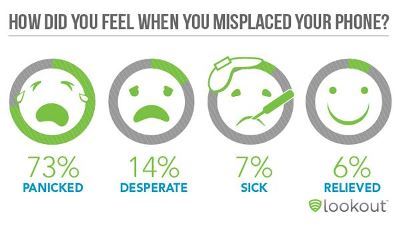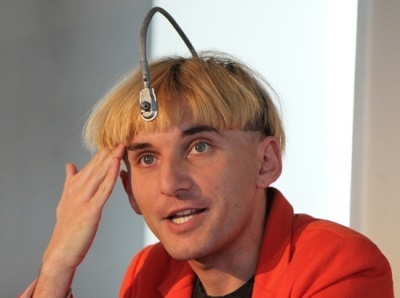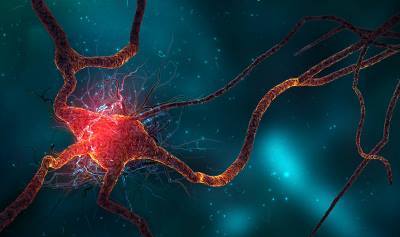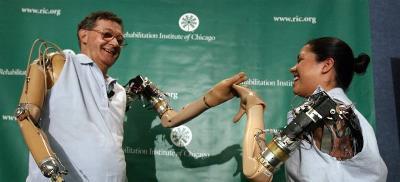Jeremie Averous's Blog, page 94
February 9, 2016
Why the Winners in the IoT Space Will be Those That Will Overcome Security Issues
The Internet of Things (IoT) means that an increasing number of “things” are connected to the internet. It’s coming, and it is going to change the industry.
 Hacked car in the ditch (Wired)
Hacked car in the ditch (Wired)Read the now well-known story how hackers managed to compromise completely a Jeep Cherokee in Wired. Don’t you find that scary? And that is just the start of the problem as more and more objects get connected.
We can heap up all sorts of security layers, once something is connected to the internet, it will always be possible with sufficient effort to hack it (it needs to be worth the effort of course!). The questions about security, safety and privacy linked to the Internet of Things are substantial, and they have no obvious answer yet. This excellent article in Forbes summarizes the challenges. Now it is clear that for the moment “Connectivity [of things] has outpaced security“.
The winners in the Internet of Things space will be those that implement a comprehensive security approach – like those who won in the area of peer-to-peer online payments (like paypal) were ultimately those who were the best at avoiding fraud. It is about implementing a comprehensive systemic approach to security, and not a device-based approach.

February 6, 2016
Why the Internet of Things Will Lead to the Emergence of New Industry Giants
The Internet of Things is coming: more and more objects have sensors that can be connected to the internet. We are actually lagging behind the available hardware to invent applications. But the actual capability is now present.
 “The big game changer is that when all these physical objects can sense, analyze and interact on their own, it changes how and where decisions are made, and who makes them. The important thing to remember though is the embedded device by itself is not the game changer….it’s the combination of the applications, the people, and the processes around the ‘things’” (from IBM Center for Applied Insights).
“The big game changer is that when all these physical objects can sense, analyze and interact on their own, it changes how and where decisions are made, and who makes them. The important thing to remember though is the embedded device by itself is not the game changer….it’s the combination of the applications, the people, and the processes around the ‘things’” (from IBM Center for Applied Insights).
Implementing the IoT will take time, and many trials and inventions. A good summary of the challenges in this ParisTechReview paper ‘From flowerpots to containers: a subtle anatomy of Internet of Things’.
We can already predict the emergence of new giant players that will master the applications in the Internet of Things, like Google and Facebook emerged from the first and the second version of the internet. And it is not a given that this time they will emerge from the Silicon Valley. The game is open!

February 4, 2016
Are You Suffering from Nomophobia?
Nomophobia is the most common phobia nowadays: the phobia of being without one’s phone. (literally: NO-MObile-PHOBIA)
 Most people are anxious when they misplace their phone (and most don’t spend one hour without checking it for updates!) – so don’t feel special if that is what happens to you.
Most people are anxious when they misplace their phone (and most don’t spend one hour without checking it for updates!) – so don’t feel special if that is what happens to you.
It’s quite tough to remember the time when we did not have any mobile phone, and then we had a mobile phone that was dumb. Still, amazingly, people did live well and be happy at that time. It just required a bit more advance planning for appointments and navigation…
Anyway, here’s a link to a nomophobia test. Some questions as an extract – do you recognize yourself?
I am annoyed if I can’t look information up on my smartphone when I wantto do so.
Running out of battery in my smartphone scares me.
If I have no data signal or can’t connect to Wi-Fi, then I constantly check to see if I have a signal or can find a Wi-Fi network.
Be aware of your nomophobia – it starts to be a condition that is studied by psychiatrists!!

February 2, 2016
How To Use Technology To Open More Possibilities
Technology is often seen as a threat – like Artificial Intelligence and the singularity where machines will become more intelligent that man. But technology is not too often mentioned as opening possibilities.
Since a long time technology is opening possibilities in the form of compensating for failing senses: pairs of glasses, hearing aids and other prosthetic help a lot of people live an normal life. Even more visibly for people with disabilities or who have lost limbs.
 Neil Harbisson and his permanent cyborg implant
Neil Harbisson and his permanent cyborg implantBut technology also enables us to do things that we could not perform with our body alone: transport ourselves quickly, above ground and under ground, fly in the air… New technology will also give us the possibility to open new senses, in addition to provide support to our memory, allow us to understand foreign languages instantaneously, etc..
Some are already quite advanced in the cyborg world of increased senses such as Neil Harbisson, auto-proclaimed the first cyborg. As an artist he seeks to increase his perception by adding sensors that capture colors he can’t see and give him the information otherwise (through some brain wiring). Have a look at his TED talk!
In the future we should rather see how technology can expand our capabilities and support our creativity rather than shrink from a fear that it might replace us completely. But how we will operate with the new technology is still something that needs to be invented – a real revolution!

January 30, 2016
What the Biggest Act of Love is
I loved Manal Ghosain’s post on The Biggest Act of Love. As she writes,
“The biggest act of love is to allow others to be who they are—fully and unconditionally“.
WOW – how true this is!
It is amazing when I searched the internet for an illustration for this post, how many quotes I found about being oneself and defending oneself against others’ influence – and how few quotes I found about allowing others to be themselves.
 Still it is really what is the reflect of true love. It is true romantic love and it is true love to your children.
Still it is really what is the reflect of true love. It is true romantic love and it is true love to your children.
Allow them, encourage them to be themselves. Love them.

January 28, 2016
How We Continue To Create New Neurons as Adults
Following on our post on brain plasticity there is new evidence that we continue to create neurons in our brains throughout our lives, and in particular in the Hippocampus, where our memories are stored.
 A good summary is in this post ‘How Our Behaviors and Activities Control the Growth of New Cells‘ by Valeria Maltoni.
A good summary is in this post ‘How Our Behaviors and Activities Control the Growth of New Cells‘ by Valeria Maltoni.
We do produce some new neurons. Not so many, but ‘Jonas Frisén from the Karolinska Institutet has estimated that we produce 700 new neurons per day in the hippocampus. You might think this is not much, compared to the billions of neurons we have. But by the time we turn 50, we will have all exchanged the neurons we were born with in that structure with adult-born neurons‘.
The next question is then, how we could or should influence this creation of new neurons. The post referred to supposes it is better to foster the creation of more, but I guess that is still part of research.
In any case, this research is another blow to the Industrial Age theory or all theories around the fact that we can’t change significantly behaviors and memories.

January 26, 2016
How Our Brain Remains Highly Plastic at All Age
I have been quite astonished lately to read a number of accounts of nerve rewiring that work. Nerve rewiring is about taking some nerves from a distinct region to rewire a region that has been cut-out for some reason. And suppose the brain will make sense of the change to regain functionality.
 Prosthetic limbs operated by thought – the result of nerve rewiring
Prosthetic limbs operated by thought – the result of nerve rewiringIt starts to become a way to treat people with damage to their spine (like here) and also a way for amputees to operate their prosthetic limb (like here and here in the Economist in 2010).
I read the most bizarre account of such a possibility in Scott Adam‘s (the cartoonist creator of Dilbert) latest book ‘How to Fail at Almost Everything and Still Win Big: Kind of the Story of My Life‘. Scott Adams has been suffering from a condition called spasmodic dysphonia: his vocal cords did not respond in a normal manner when speaking in public. A very debilitating condition, and Scott Adams could not find any solution for years. The full account is also in this Wired post. Finally the solution was found when a surgeon proposed to reroute some neck nerves with other functions to his vocal chords. Suddenly after 3 months, as predicted, after his brain had learnt to use these new entry points, Scott was able to speak again, and after some exercise, regained his voice.
All these experiments prove that our brain is able to relearn and rewire at all ages, and keeps an astonishing plasticity to adapt. We need to stop believing these industrial age cliche that our brain is formed in our 20s’. It continues to evolve, and can even manage dramatic changes, any time during our lives.

January 23, 2016
Why There Will be More Conspiracy Theories and Believers
Psychology shows that faced with uncertainty, we always desperately try to recognize patterns and explanations. And the more uncertainty, the more we seek patterns. This explains a lot of conspiracy theories: they are just a way for people to find order in the uncertain.
 Lots of conspiracy theories after 9/11
Lots of conspiracy theories after 9/11Conspiracy theories flourish after each event that appears to be significantly out of sync with the normal: 9/11 attacks, the strange disappearance of Malaysian Airlines flight MH370 etc. Everything we can’t explain directly, which appears to be weird in the order of things, is susceptible to a conspiracy theory.
Because complexity increases in our world, unexpected major events are also due to happen more frequently, and be even more out of sync with the average. Therefore, we can expect that more conspiracy theories will also come up as people struggle to find sense to what happens to them and the world.
There will be more conspiracy theories and believers because it is so hard to apprehend that complex systems sometimes show behavior significantly out of sync with the normal and average. Before believing in conspiracy, pause for a moment to ask yourself whether it would not just be the normal behavior of our complex world.

January 21, 2016
How the Legal Reference Industry is Being Rebooted
The Harvard Law library (which contains reference to most of US law cases since the US colonial times) is getting digitized and will be available for search for the public. In what is a development that will redefine the law industry, legal references in the US will finally be more searchable and available and far more in the past than now. This will redefine the legal publication industry, as well as the tasks of thousands of junior legal staff that until now had sometimes to search manually through thousands of pages to support their cases. Also, a lot of the digitized databases were only available at very high cost.
 Shelves of law books we are getting rid of!
Shelves of law books we are getting rid of!This paper from the NY Times explains the detail and analyses the consequences of that project. While a lot was already available in digital format, it came at a steep price from specialized companies. As explained in the paper, those companies do support the initiative with a deal that will make the data only progressively available to the general public over the next eight years, time for them to redefine their business model and develop some advanced tools on the basis of the raw data that they can sell for a profit. Still, the trend is here to make the information free and available for all.
Even the information that was standing on shelves for the last two centuries is now getting free. We are decidedly moving towards an era of free and available information, where most of the information ever produced by humans on a support will be available to all, anywhere.

January 19, 2016
How the Move to Mobile Highlights the Broadcasting Majority
Let’s be honest – I can’t create on a tablet or a phone. I can only consume information, or have simple interactions. I struggle to write an email that is more than 3 lines long. Thus when I read that mobile devices are taking over the traditional PC, I also read that most people probably don’t create, and if they ditch their PC, they remove the means to create the more easily.
 I can’t create without my traditional laptop or PC. I need a keyboard to efficiently write my blogs and books. I need a mouse to create my powerpoint slides or work efficiently in Photoshop. In summary, I need some accessories to enhance my creative productivity that are absent from mobile devices.
I can’t create without my traditional laptop or PC. I need a keyboard to efficiently write my blogs and books. I need a mouse to create my powerpoint slides or work efficiently in Photoshop. In summary, I need some accessories to enhance my creative productivity that are absent from mobile devices.
The move to mobile is once again the demonstration that most people prefer just receiving broadcast and reading and viewing stuff created by others. That’s not an issue by itself, because that can be expected. It is an observation. It is also on what Facebook and many other sites and apps are counting on.
Just make sure you don’t diminish your ability to create. Keep the means around, like a traditional laptop.




